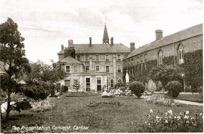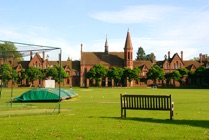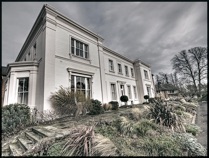glimpses of my life and thoughts
Schools
Friday, 3 August 2018



Reading Grammar School
Leighton Park School (School House)
Presentation College
Following an unproductive term spent in the local village school and a spell of home teaching I landed up St Joseph’s Catholic Convent School run by a bevy of nuns, which was sort of OK.
Presentation College 1933-1936
Then came a few years at Presentation College run by a gang of Catholic Brothers. My ‘aunties’, firm Anglicans, went ballistic when they found out that I was being required to learn the catechism by heart. From then on I was exempted from RI lessons, so I felt a bit isolated.
One of the Brothers spent much of the lesson time sitting at his desk marking the work of a boy standing beside him. I noticed that pen in one hand poised over the exercise book, his other hand would sometimes creep up inside a boy’s shorts and stay there for quite a while. And wobble around a bit. I was too young then to know what was going on, but a bit surprised that none of these boys seemed to mind the intrusion. I suspect that I was just a weeny bit jealous that it never happened to me. This would surely now qualify as abuse.
The school went bust a few years ago but not before spawning a few people who became famous, including the author of Paddington Bear and a recent Archbishop of Westminster. Another, less famous like me, has become a life-long friend.
Reading Grammar 1936-1937
The plan was for me to go to Reading Grammar School, now simply Reading School. And I did go to the junior school there, for just a year. My time there culminated prematurely when I was falsely accused by a boy of stealing someone’s bicycle bell. The Headmaster, a towering man well over 6ft, chose to believe them rather than me. Incandescent with rage at this injustice I refused to succumb passively to ‘six of the best’. I kicked and punched him as he gripped me in his arms and flayed around with the cane in a vain attempt to make proper contact, with bloody drops from his nose falling on my jacket. It gave me some satisfaction that at assembly the following morning he appeared on the stage with a plaster over his nose. Could I have broken it? That was the first and last time I have ever engaged in a physical fight with anyone. As far as I can remember!
Inevitably as a consequence my days there were numbered. But until I left I did notice that the other teachers regarded me a little warily!
Leighton Park 1937-1943
During my six years at Leighton Park I cannot recall a moment of unhappiness. “What would you like to do during Hobby Hour? We’d like you to choose two of the options on this list”, a teacher asked me on the first day. The choice was extensive — painting, model railways, bookbinding, pottery, metalwork, music, woodwork, cane weaving and so forth. Each activity was supervised by a professional craftsman — apart from music practice which was one of my choices. The other was bookbinding.
The staff were efficient, friendly, knowledgeable and hardworking. For the first time in a school I felt important to the teachers and part of the community. At that time it was predominantly boarding. I was one of a small minority of day boys, but we all joined in activities until quite late in the day, Saturdays included, and sometimes the Sunday morning Quaker meeting in Reading and the Sunday evening service at school.
The aura of the school owed much to its Quaker foundation. It was a happy blend of the traditional and the progressive, strong both academically and in sport. Staff and pupils worked together on the school farm and on projects such as building a new cricket pavilion. Significantly for me, there was no corporal punishment. And through attendance at Meetings I learned to appreciate the power of silence.
Once a year lessons were cancelled and the whole school went walking. You signed up for how many miles you wanted to do, ranging from 6 to 20 depending on your age and aptitude, each group starting from a different place. One year all the groups converged on the top of Inkpen Beacon near Newbury. Most of the wives of the staff and others were there preparing food on an open fire. After that it was strawberries and cream on the nearby estate of Sir Philip Reckett. Happy days.
Although I played rugby and tennis for the school music was my principal pastime. I enjoyed playing in school concerts and so on, and I also scraped on the violin in the school orchestra. We made the most frightful noise.
Once there was a trip to an Albert Hall Prom when Henry Wood conducted Beethoven’s 7th Symphony, and another to Oxford’s Sheldonian Theatre where William Walton conducted the first performance of his violin concerto with Ida Haendel as soloist. Inspirational, magical events.
wartime memories
When war came the corridor in the main building was braced with thick beams and props much like in a coal mine. We went there during an air raid and stayed until the all-clear. There was a rota for fire watching at nighttime — one boy and one master every night.
One of the Houses was taken over by the WAAF (Women’s Auxiliary Air Force). The second floor in the building, across a patch of grass from the school, was directly in line with a classroom and used as a dormitory. Within days several binoculars were in action. Hours later thick curtains were put up. Disappointing.
The monsieur French master once brought in a copy of The Times. Scanning the pages he suddenly jumped up from his desk in great excitement pointing to some advert. We had no idea what it was about. Within days he’d left. By chance several years later I bumped into him swaggering down Pall Mall wearing the uniform and sporting the cane of an army major. He spotted me before I recognised him. I think he’d been recruited to serve the Free French under Generale de Gaulle.
The German master disappeared overnight on the outbreak of war to be interned as an enemy alien.
I gained a great respect for the Quakers and for E B Castle the headmaster. He went on to become a professor of education.
Never an outstanding scholar, I enjoyed most subjects, maths in particular. And I did well enough to gain a place at Christ’s College, Cambridge in 1943. I was fortunate to have attended such a splendid school, aware too that it had been a privileged education.
On holiday at home many a happy day was spent cycling around the Berkshire countryside, rowing on the Thames often on my own but sometimes with a friend from school. He was killed in France during the last week of the war.
